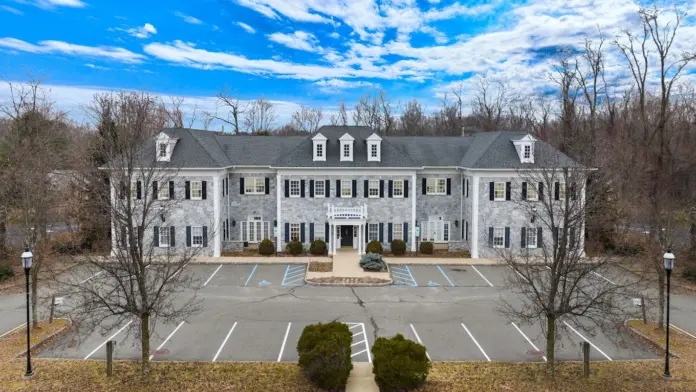About Rolling Hills Recovery Center New Jersey Drug & Alcohol Rehab
Rolling Hills Recovery Center is state licensed, and one of the best outpatient drug and alcohol rehab facilities in Chester, New Jersey. Providing a continuum of treatment from partial hospitalization care to intensive outpatient programs, their interdisciplinary team looks at addiction from all angles. This includes the whole person, the community around that person, and even the environment. They also offer specific programs for veterans, healthcare workers and first responders.
Partial Hospitalization Care Program
Focusing on education and skill attainment, their partial care program meets six days a week for five hours a day. This group therapy is supplemented by individual sessions using cognitive behavioral therapy (CBT) and dialectical behavioral therapy (DBT), as well as experiential therapies like art, music and yoga. In partial care, they help you develop coping skills and address post acute withdrawal issues. Because they recognize that substance use is a family disease, a minimum of two family sessions per month are also required.
Outpatient Therapy in Chester
The intensive outpatient program (IOP) meets three to five days a week for three hours a day for group therapy. Individual and family counseling is part of your program. This outpatient program lasts anywhere from four weeks to six months and focuses on your individualized relapse prevention plan. All programs are enhanced by 12 step meetings, case management, and psychotherapy for co-occurring disorders.
A Range of Treatment Modalities
In addition to these programs they offer medication assisted treatment (MAT), eye movement desensitization and reprocessing (EMDR), and various recreational therapies as overseen by a recreational therapy specialist. This includes equine therapy and reiki. It’s their aim to provide the most innovative and scientifically proven modalities available so as to best treat both the entire person and their family on the journey to recovery.
Facility Overview
Latest Reviews
See AllRehab Score
Gallery
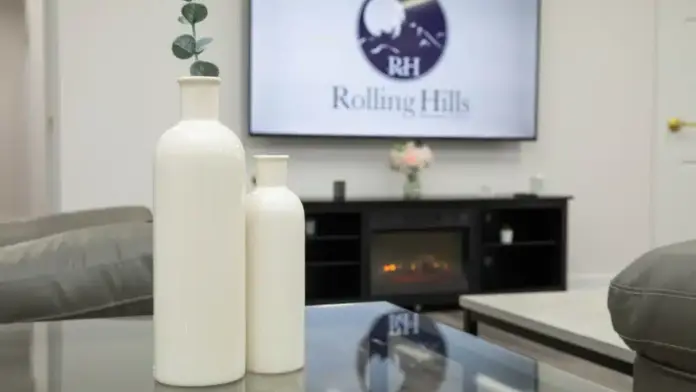
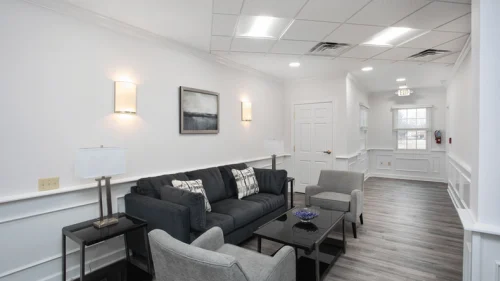
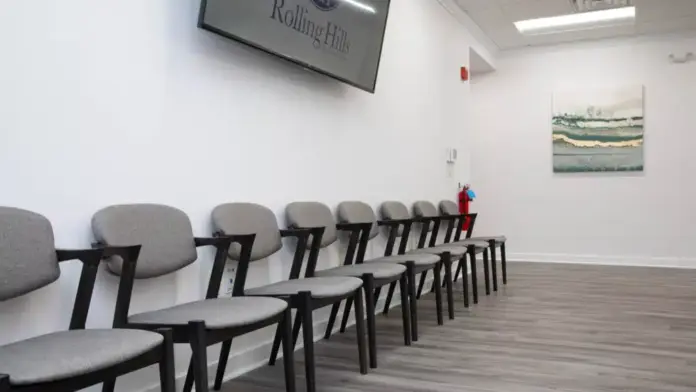

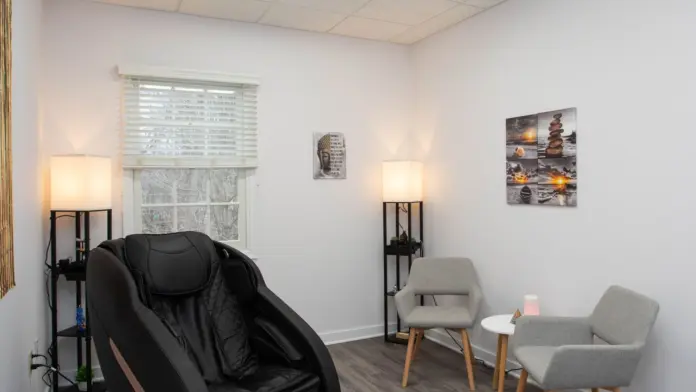
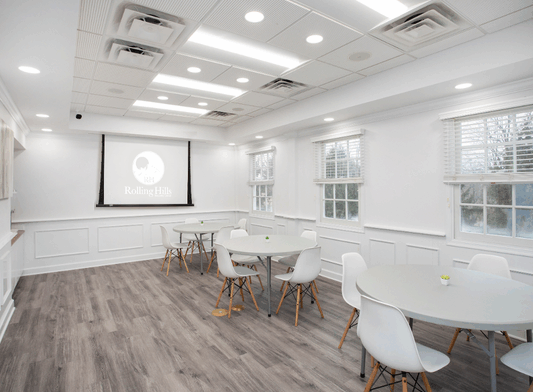
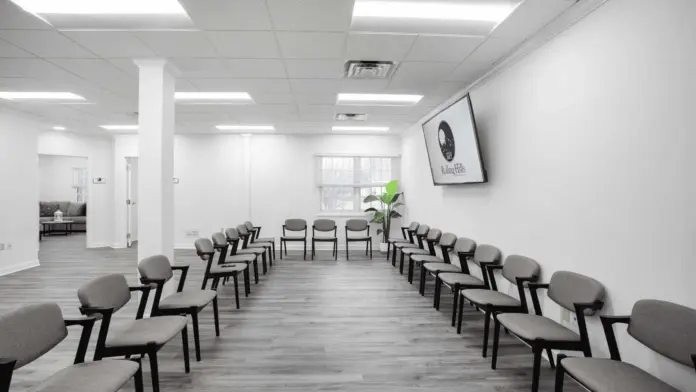
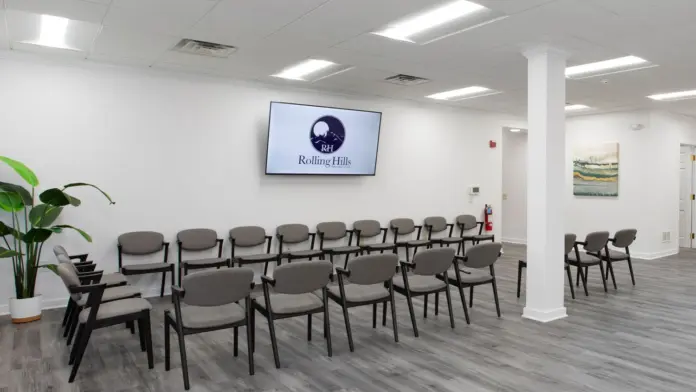
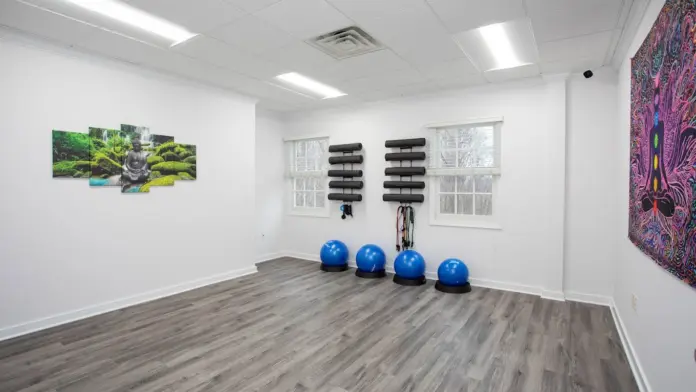
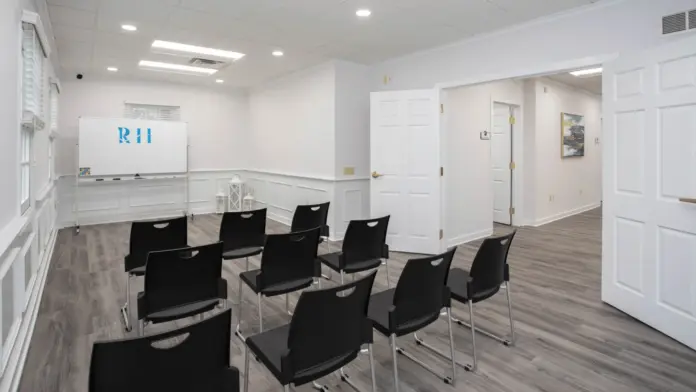
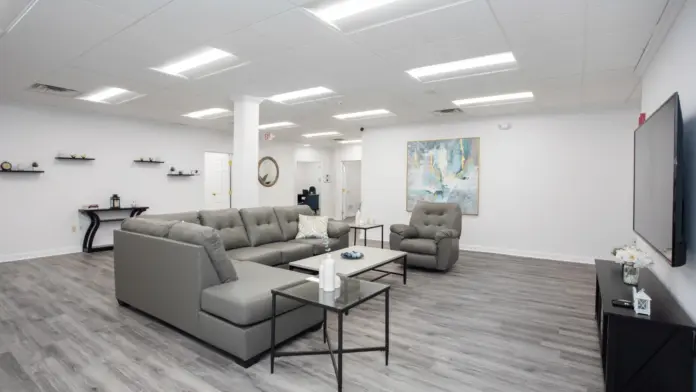
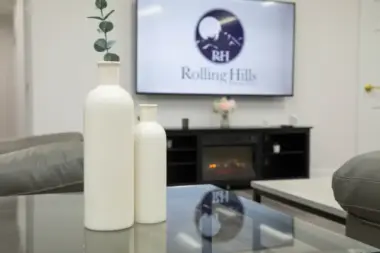
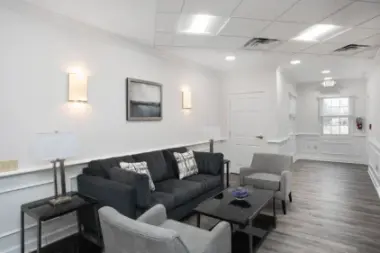
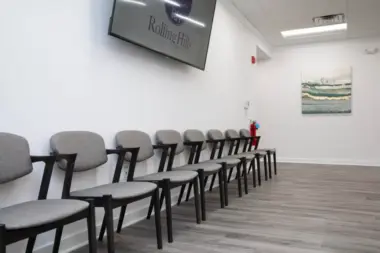

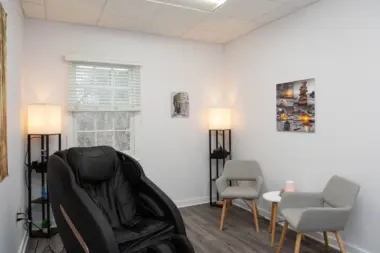
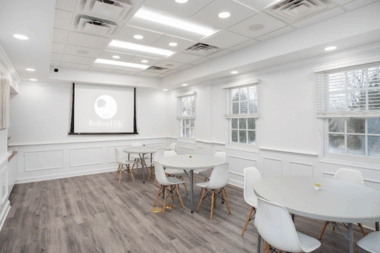
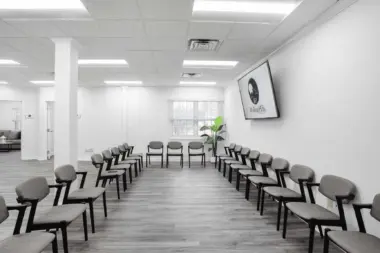
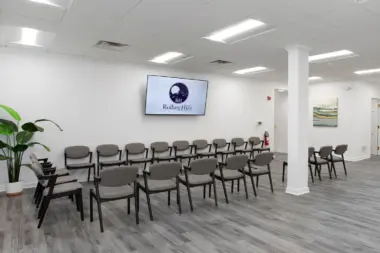
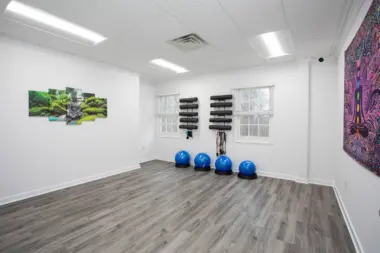
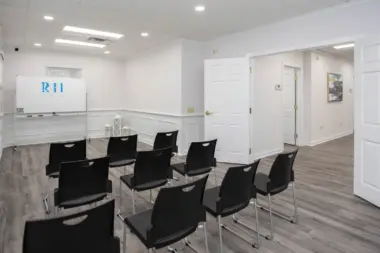
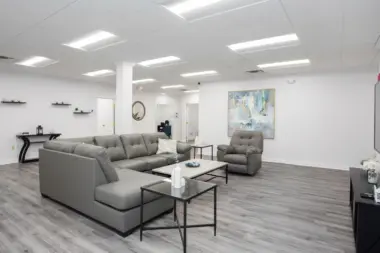
Accepted Insurance



Other Forms of Payment
Private insurance refers to any kind of healthcare coverage that isn't from the state or federal government. This includes individual and family plans offered by an employer or purchased from the Insurance Marketplace. Every plan will have different requirements and out of pocket costs so be sure to get the full details before you start treatment.
Self-pay involves paying for treatment out of your own pocket. You can use savings or credit, get a personal loan, or receive help from family and friends to fund your treatment. If you don't have insurance or your insurance plan doesn't cover a specific program, self-pay can help ensure you still get the care you need.
Addiction Treatments
Levels of Care
Rolling Hills offers outpatient rehab programs that fit around clients’ schedules, with 1-2 hour daily sessions and weekly individual therapy. This least intensive treatment option supports those with mild to moderate addiction issues seeking ongoing recovery support.
Inpatient rehab at Rolling Hills provides 24-hour structured care in a licensed residential setting, ideal for severe addiction or co-occurring disorders. The program includes safe housing, medical attention, and comprehensive therapy to foster lasting sobriety.
The Intensive Outpatient Program (IOP) involves 9-15 hours of group therapy weekly, with individual and family therapy options. It emphasizes skill practice and relapse prevention, supporting clients’ transition from higher levels of care toward sustained recovery.
Rolling Hills offers sober living homes as part of its long-term residential treatment, providing a structured environment that includes therapy, work, and personal time. These homes support ongoing addiction recovery and help residents develop life skills.
The facility provides medically assisted detox to ensure safe withdrawal from alcohol and drugs, using medications like methadone and benzodiazepines to ease symptoms. This essential first step supports clients’ transition into comprehensive addiction treatment.
Treatments
Rolling Hills Recovery Center offers detoxification programs to safely manage alcohol withdrawal symptoms, emphasizing the importance of combining detox with ongoing therapy. The program helps clients develop coping skills and relapse prevention strategies essential for long-term alcohol recovery.
The outpatient treatment at Rolling Hills includes evidence-based therapies like Cognitive Behavioral Therapy and Motivational Interviewing, designed to address drug addiction. This flexible program supports relapse prevention and helps clients build essential skills for sustained recovery.
Rolling Hills provides inpatient rehab tailored for opioid addiction, offering 24-hour structured care, medical attention, and a substance-free environment. The program is ideal for those with severe opioid use disorder, supporting sobriety and dual diagnosis treatment.
The center’s outpatient programs utilize therapies such as Cognitive Behavioral Therapy and psychological counseling to treat various substance abuse issues. These services focus on relapse prevention and skill development in a flexible outpatient setting.
Programs
Rolling Hills’ adult program features an Intensive Outpatient Program lasting 6-10 weeks, with group and individual therapy tailored to adult clients’ needs. The program emphasizes relapse prevention and skill development for sustainable recovery.
The young adult program at Rolling Hills includes a 6-10 week Intensive Outpatient Program with group therapy, individual sessions, and family involvement. It is designed to meet the unique needs of young adults seeking effective addiction recovery support.
Clinical Services
Cognitive behavioral therapy (CBT) in New Jersey typically follows a set structure of treatment. The therapist helps clients identify their life challenges and their thoughts surrounding those challenges. The client then learns to identify unhealthy thought patterns and reshape those into healthy patterns of thinking and behavior.
Dialectical means opposing. The premise of dialectical behavior therapy is to learn how two things that seem to be opposite can actually be true. You learn how to accept yourself while also making changes. The focus is on accepting your emotions and changing how you manage them.
Group therapy settings offer you a diverse perspective on addiction and recovery. People from a variety of backgrounds gather together to discuss their challenges and speak openly and in a nonjudgmental atmosphere. This enriches your experience and your understanding of addiction and recovery.
During individual therapy for drug addiction, patients receive a customized and tailored approach to understanding their unique circumstances and providing them with targeted interventions. These include coping skills, relapse prevention plans, and developing resilience, all of which are essential for long term recovery.
Motivational interviewing helps clients find their motivation to change. It can be an effective method to work with clients who are angry or hostile or feel insecure about their ability to make changes in their lives. It is often used during addiction treatment or to manage physical health conditions.
Trauma therapy provides a structure to approach healing from past traumatic events that you may have witnessed or experienced. Your therapist will work with you to identify and process these memories. This helps promote a sense of safety and stability and helps you heal emotionally.
Family therapy sessions address addiction related conflicts and other issues between members of the family unit. By strengthening communication and coping skills, as well as creating a nurturing environment, the family can help support their loved one's recovery.
The main types of creative arts therapy in New Jersey are dance, art, drama, and music. Through creative processes and active art making, this treatment provides a safe setting free of judgment for participants to explore and express their challenging thoughts and emotions.
Amenities
-
Private Transportation
-
Yoga Studio
-
Wifi
-
Residential Setting
-
Private Rooms
-
Hiking
-
Mountain Views
-
Gardens
-
Walking Trails
Staff & Accreditations
Staff

Dr. Anthony Oparaji, MD
Medical Doctor
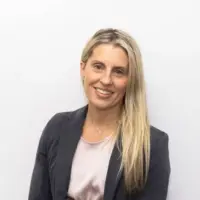
Laura Riley, LCADC, CCS
Clinical Director
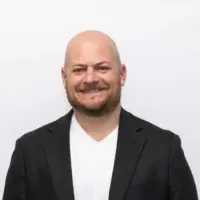
Mike Levy
Executive Director
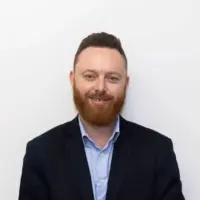
Bobby Barbarite
Director of Client Care
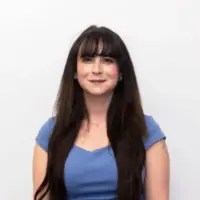
Chloe Barbarite
Director of People & Culture
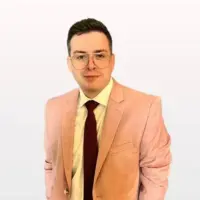
Ryan Fidotta
VP of Business Development
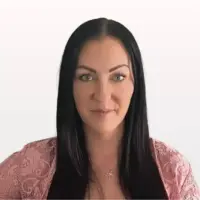
Samantha Souders
Director of Admissions
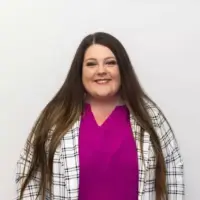
Debra Breheny
Regional Director of Outreach
Accreditations

The Substance Abuse and Mental Health Services Administration (SAMHSA) is a branch of the U.S. Department of Health and Human Services. Established in 1992 by congress, SAMHSA's mission is to reduce the impact of substance abuse and mental illness on American's communities.
SAMHSA Listed: Yes

LegitScript has reviewed Rolling Hills Recovery Center New Jersey Drug & Alcohol Rehab as part of their certification program, and has determined that it meets the LegitScript standards for legality, safety and transparency.
LegitScript verified in

State Licenses are permits issued by government agencies that allow rehab organizations to conduct business legally within a certain geographical area. Typically, the kind of program a rehab facility offers, along with its physical location, determines which licenses are required to operate legally.
State License: New Jersey

The Joint Commission, formerly known as JCAHO, is a nonprofit organization that accredits rehab organizations and programs. Founded in 1951, the Joint Commision's mission is to improve the quality of patient care and demonstrating the quality of patient care.
Joint Commission Accreditation: Yes

